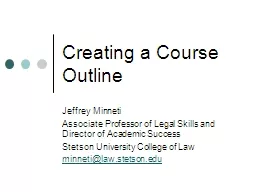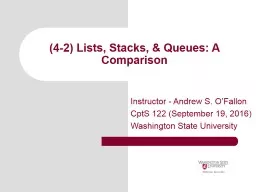PPT-Outline In this topic, we will look at linked lists
Author : sherrill-nordquist | Published Date : 2019-11-08
Outline In this topic we will look at linked lists The Node and List classes Accessors and mutators The implementation of various member functions Stepping through
Presentation Embed Code
Download Presentation
Download Presentation The PPT/PDF document "Outline In this topic, we will look at ..." is the property of its rightful owner. Permission is granted to download and print the materials on this website for personal, non-commercial use only, and to display it on your personal computer provided you do not modify the materials and that you retain all copyright notices contained in the materials. By downloading content from our website, you accept the terms of this agreement.
Outline In this topic, we will look at linked lists: Transcript
Download Rules Of Document
"Outline In this topic, we will look at linked lists"The content belongs to its owner. You may download and print it for personal use, without modification, and keep all copyright notices. By downloading, you agree to these terms.
Related Documents














